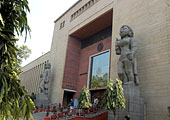|
 What
is it? A management theory developed by Eliyahu M. Goldratt,
59, (left) an Israel-born physicist-turned-business consultant,
which says that a company's growth is retarded by one specific
bottleneck in its organisational structure. The Viable Vision
model of implementing this theory aims to make a company's net
profits equal its sales figures in four years. What
is it? A management theory developed by Eliyahu M. Goldratt,
59, (left) an Israel-born physicist-turned-business consultant,
which says that a company's growth is retarded by one specific
bottleneck in its organisational structure. The Viable Vision
model of implementing this theory aims to make a company's net
profits equal its sales figures in four years.
Who's using it? It was initially used by manufacturing
companies in developed markets, but as growth has plateaued, it
has found many more takers in developing regions like India.
Why is it useful? Some of India's fastest growing industries
like IT may be hitting some constraints in terms of cost and labour
arbitrage and this model may offer companies a radically different
business model.
Who is offering it? Satyam Computer Services has the
largest number of consultants trained in the execution of TOC.
"We have 25 consultants skilled in Goldratt offerings, and
we aim to ramp up to 50 or 60 soon," says Mohan Srinivasan,
VP (Business Consulting Practice), Satyam.
-Rahul Sachitanand
How RBI Controls Money Supply
 What
are the main instruments? Repo Rate, Reverse Repo Rate, Bank
Rate and the Cash Reserve Ratio (CRR). What
are the main instruments? Repo Rate, Reverse Repo Rate, Bank
Rate and the Cash Reserve Ratio (CRR).
The Repo Rate: This is the rate at which RBI releases
funds into the system. It was at 6 per cent in 2004 but is now
at 7.75 per cent.
Reverse Repo Rate: This is the rate at which RBI sucks
out excess liquidity from the system. The reverse repo rate is
currently at 6 per cent.
Bank Rate: This is the rate at which RBI lends money
to banks. It is currently at 6 per cent.
CRR: This represents the percentage of deposits that
every bank has to keep with the RBI. The RBI pays interest on
CRR balances and increases or decreases the CRR when it wants
to drain or ease liquidity in the economy. The CRR is now at 6.5
per cent.
SLR: Statutory Liquidity Ratio is the percentage of deposits
that banks have to deploy in government securities and works in
the same way as CRR. It is now at 25 per cent and has not been
changed for a decade.
-Anand Adhikari
ECONOMY WATCH
CONSUMER PRICE INDEX
Status: 7.3 per cent.
Impact: The rising consumer price index is clearly the
result of the gradual rise in food prices. This will soon start
impacting household budgets and may result in cutbacks in expenditure
on other items. If left unchecked, it can impact the consumer
boom that's currently driving demand in the economy.
INTEREST ON CAR LOANS
Status: 13.5 per cent.
Impact: The rising interest rates will impact car sales
in India, and affect both domestic and foreign automobile companies
that have created large capacities in anticipation of growing
passenger car demand in the country.
-Compiled by Anand Adhikari
P-WATCH
A bird's eye view of what's hot and what's
not on the government's policy radar.
ARE PHARMA CLOTS DISSOLVING?
 |
| Multinational pharmas: Secure in India |
The government finally appears to be smoking the peace pipe.
Multinational pharma majors like Merck and Novartis can hope to
secure sales of their patented drugs (which, for most part, end
up in complicated life saving procedures) in the country; a government
panel is working on a regime where the prices of such drugs will
be negotiated.
The benchmark: it will match the lowest price anywhere else
in the world. The committee will meet in the next fortnight to
finalise the terms of the deal.
All the clogs in the peace pipe are far from dissolved: the
main pharma market revolves around the generic business, for which
the government has appointed an Empowered Group of Ministers that
is slated to meet later this month. The problem: Union Minister
of Chemicals & Fertilisers Ram Vilas Paswan wants more price
regulation. Currently, the 74 drugs under price control account
for 30 per cent of the industry's revenues.
Hopefully, resolution on this count will pave the way for a
pharma policy, although there are other issues like taxation that
need to be addressed, since the consumer price is close to twice
the production cost. With the government having promised a policy
in 2002, any further delay will only add to its embarassment.
-Aman Malik
GOVT REASSERTS CONTROL IN OIL
|
EMPOWERED BUREAUCRACY
|
|
DGH stripped of financial powers
Petroleum ministry to monitor exploration costs of contractors
|
While exploration of oil and gas has become an attractive business
in recent years, spurred by the hardening of global crude oil
prices as well as the improved prospects of finding hydrocarbons
in the country, regulation has not kept pace. The result: the
government has taken back the powers it had delegated to its technical
arm, the Directorate General Hydrocarbons (DGH), to discharge
a significant part of its contractual obligations vis-à-vis
the contractor (exploration company). Reason: a liberal policy
adopted by the DGH in approving costs of contractors. So, companies
like Reliance and BG will have to visit the bureaucrats more often
than in the past, when interaction was largely with the DGH (for
getting their costs approved, since recovery of such costs is
allowed contractually).
Surely, the government is to blame for another reason: last
year, it consciously decided against setting up a regulator for
the exploration business.
-Balaji Chandramouli
DIRECT DEALING FOR LAND
 Faced
with criticism over the low compensation to farmers for land acquired
for SEZs and other industrial projects, the government is planning
a legislation that will ensure direct dealing between the farmer
and land acquirers. Faced
with criticism over the low compensation to farmers for land acquired
for SEZs and other industrial projects, the government is planning
a legislation that will ensure direct dealing between the farmer
and land acquirers.
The move will eliminate those interested in boarding the SEZ
bandwagon to make a quick buck on land arbitrage-buying land at
below-market rates determined by the state government (and paid
to the farmer) and selling the developed land at market prices
or unlocking its true value in the financial market place by mortgaging
it to secure a loan.
With companies acquiring land themselves, the cost of land acquisition
will certainly shoot up, but the process will probably be seen
to be far more just and equitable than the prevailing situation,
which has sparked off protests across the country. Evidently,
Prime Minister's often repeated refrain of ensuring inclusive
growth is finally taking shape. And, Indian industry is not complaining.
-Shalini S. Dagar
|





 What
is it? A management theory developed by Eliyahu M. Goldratt,
59, (left) an Israel-born physicist-turned-business consultant,
which says that a company's growth is retarded by one specific
bottleneck in its organisational structure. The Viable Vision
model of implementing this theory aims to make a company's net
profits equal its sales figures in four years.
What
is it? A management theory developed by Eliyahu M. Goldratt,
59, (left) an Israel-born physicist-turned-business consultant,
which says that a company's growth is retarded by one specific
bottleneck in its organisational structure. The Viable Vision
model of implementing this theory aims to make a company's net
profits equal its sales figures in four years. What
are the main instruments? Repo Rate, Reverse Repo Rate, Bank
Rate and the Cash Reserve Ratio (CRR).
What
are the main instruments? Repo Rate, Reverse Repo Rate, Bank
Rate and the Cash Reserve Ratio (CRR).

 Faced
with criticism over the low compensation to farmers for land acquired
for SEZs and other industrial projects, the government is planning
a legislation that will ensure direct dealing between the farmer
and land acquirers.
Faced
with criticism over the low compensation to farmers for land acquired
for SEZs and other industrial projects, the government is planning
a legislation that will ensure direct dealing between the farmer
and land acquirers.